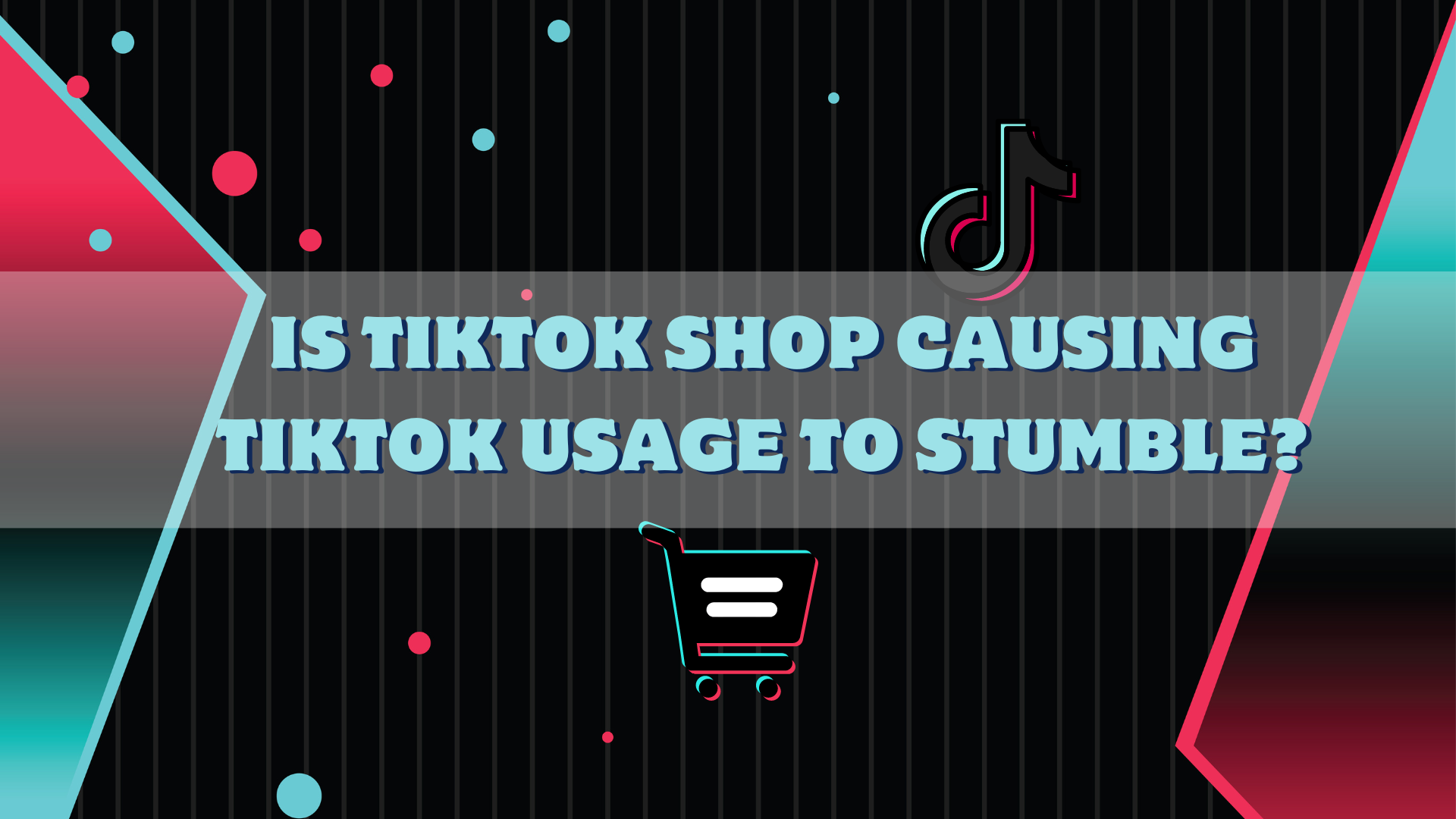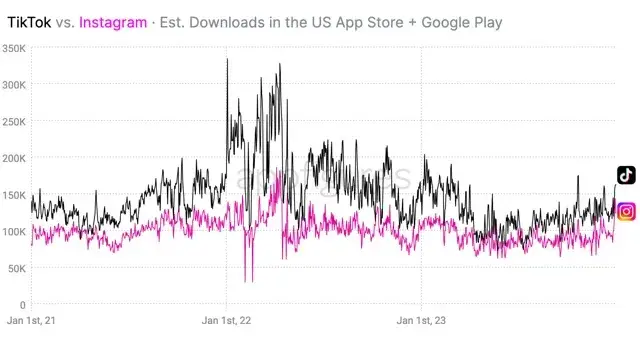Is TikTok Shop Causing TikTok Usage To Stumble?

In this digital era, where social media platforms reign supreme, TikTok has emerged as a formidable force. However, recent trends suggest a slowdown in its usage. This article explores the potential reasons behind this phenomenon, focusing on the role of TikTok Shop. As we delve into this analysis, we invite you, the reader, to join us in uncovering the intricacies of this digital conundrum.
This article delves into the reasons behind the slowdown in TikTok’s usage, with a focus on the impact of TikTok Shop on user behavior and overall app engagement. By comparing strategies of TikTok and Meta, and analyzing user comments on Reddit, we offer a comprehensive understanding of this digital puzzle.
Table of Contents
TikTok Usage Is Starting To Slow: What Happened?
TikTok’s journey from a viral sensation to a social media powerhouse has been nothing short of remarkable. However, recent trends indicate a surprising shift: a slowdown in user engagement and growth. This deceleration is intriguing, especially considering TikTok’s previously unchallenged ascent in the digital world. The reasons behind this slowdown are multifaceted and complex.
We explore various factors contributing to this trend. Changes in user demographics and evolving content preferences might be influencing the platform’s appeal. The market, once ripe for TikTok’s unique blend of short-form video content, might be reaching a saturation point. Additionally, the landscape of social media is constantly evolving, with competitors introducing similar features, potentially diluting TikTok’s novelty. Regulatory challenges in different global markets could also be impacting its growth trajectory.
Is TikTok Shop To Blame?
With the introduction of TikTok Shop, the platform ventured into the realm of e-commerce, aiming to blend shopping with social media seamlessly. However, this move has led to speculation about its impact on the traditional TikTok experience. Is the shift towards e-commerce contributing to the slowdown in user engagement?
Analyzing the correlation between TikTok Shop’s introduction and the change in user engagement patterns is crucial. The question arises whether TikTok’s foray into e-commerce is alienating its core audience, who initially flocked to the platform for entertainment and creative expression. The balance between maintaining an engaging user experience and introducing commercial elements is delicate. We examine user engagement statistics, both before and after TikTok Shop’s launch, to understand its impact on the platform’s overall appeal and user retention.
What Is The Problem Of TikTok Shop?
The concept of TikTok Shop was ambitious – to merge the worlds of entertainment and shopping. However, its execution and reception have raised several concerns. The primary issue seems to be the balance between commercial and entertainment content. Users initially drawn to TikTok for its creative and entertaining content might find the surge in commercial posts overwhelming.
The platform’s algorithm, once celebrated for its ability to showcase engaging and creative content, now faces the challenge of integrating commercial posts without compromising the user experience. User feedback and reviews suggest a mixed reception. Some users embrace the convenience of shopping within the app, while others feel that it detracts from the platform’s original charm. The introduction of TikTok Shop, while innovative, may have inadvertently altered the user experience, leading to a potential decline in overall engagement and satisfaction.
Potential Influence Of The Slowness Of TikTok’s Usage
The recent slowdown in TikTok’s usage could have far-reaching implications, not just for the platform itself but for the broader social media landscape. This slowdown is not merely a statistical blip but a potential indicator of shifting user preferences and market dynamics. The implications are multifaceted, affecting various aspects of the platform and its community.
Firstly, there’s the impact on TikTok’s advertising model. Advertisers flock to platforms with high engagement and user growth. A slowdown could lead to a reassessment of ad budgets and campaigns targeted at TikTok’s audience. Secondly, the creator economy on TikTok, which thrives on high user engagement, might face challenges. Creators might find reduced engagement on their content, affecting their reach and potential earnings. Finally, the competitive landscape of social media could see shifts. Competitors might leverage TikTok’s slowdown to attract users to their platforms, offering new features or emphasizing aspects where TikTok is perceived to be lacking.
Comments On Reddit About TikTok Shop’s Ruining TikTok
User Discontent with Commercialization
On Reddit, a significant sentiment among users is the discontent with the increasing commercialization of TikTok. Users express frustration over how the platform, once a hub for creative content, is now inundated with commercial posts and advertisements. This shift is seen as a departure from the original appeal of TikTok.
Impact on User Experience
Another common thread in discussions is the impact of TikTok Shop on the overall user experience. Redditors often mention that the influx of shopping content disrupts the flow of entertainment, making the app less enjoyable. The charm of spontaneous and creative content seems overshadowed by the overt presence of e-commerce.
Comparison with Other Platforms
Discussions on Reddit also involve comparisons with other social media platforms. Users debate whether TikTok’s move towards e-commerce is making it more like traditional online shopping platforms, losing its unique edge. There’s a sense of nostalgia for the ‘old TikTok’ and a comparison with how other platforms have either successfully integrated or resisted the push towards e-commerce.
Long-Term Implications for TikTok
Finally, Redditors speculate about the long-term implications of this shift for TikTok. Concerns are raised about whether the platform can sustain its growth and popularity if it continues down the path of prioritizing e-commerce over content creativity. The discussions often revolve around whether TikTok can find a balance that satisfies both its commercial ambitions and its user base’s desire for engaging content.
TikTok vs. Meta’s Social Media
The dynamic between TikTok and Meta’s social media platforms, primarily Facebook and Instagram, presents a fascinating study in contrasting strategies and user engagement models. While TikTok revolutionized the short-form video content space, Meta’s platforms have been evolving to maintain their longstanding dominance in the social media landscape.
The key difference lies in their approach to content and user interaction. TikTok’s algorithm-driven, highly personalized feed contrasts with Facebook’s community and relationship-focused content. Instagram, while incorporating short-form video, still maintains a strong emphasis on photo-sharing and curated personal aesthetics. The competition intensifies as each platform seeks to capture a larger share of user time and engagement, with TikTok’s recent slowdown potentially offering Meta an opportunity to reclaim some lost ground.
As TikTok’s Competitor, What Did Instagram Do?
Instagram’s response to TikTok’s rise has been strategic and multifaceted. Recognizing the appeal of short-form video content, Instagram introduced Reels, directly competing with TikTok’s primary format. However, Instagram has carefully balanced this new feature with its existing strengths – a focus on visual storytelling and a robust influencer ecosystem.
Unlike TikTok’s foray into e-commerce with TikTok Shop, Instagram has been more cautious. It has integrated shopping features but has done so in a way that aligns with its existing user experience, focusing on seamless integration rather than a complete pivot. This strategy reflects a nuanced understanding of its user base – a desire for new features but within the familiar context of the Instagram experience.

Conclusion
The slowdown in TikTok’s usage and the mixed reception of TikTok Shop present a critical juncture for the platform. While it remains a significant player in the social media world, the challenges it faces are not insignificant. The balance between maintaining an engaging user experience and pursuing commercial success is delicate and requires careful navigation.
TikTok’s situation also highlights the ever-evolving nature of social media platforms and user preferences. As platforms like Instagram continue to adapt and evolve in response to competitive pressures and user expectations, the landscape of social media remains in a constant state of flux.
In conclusion, TikTok’s current predicament underscores the importance of understanding and adapting to user preferences. The platform’s future success will likely depend on its ability to balance its commercial aspirations with the needs and expectations of its user base, ensuring that it remains a vibrant and engaging space for creative expression.

